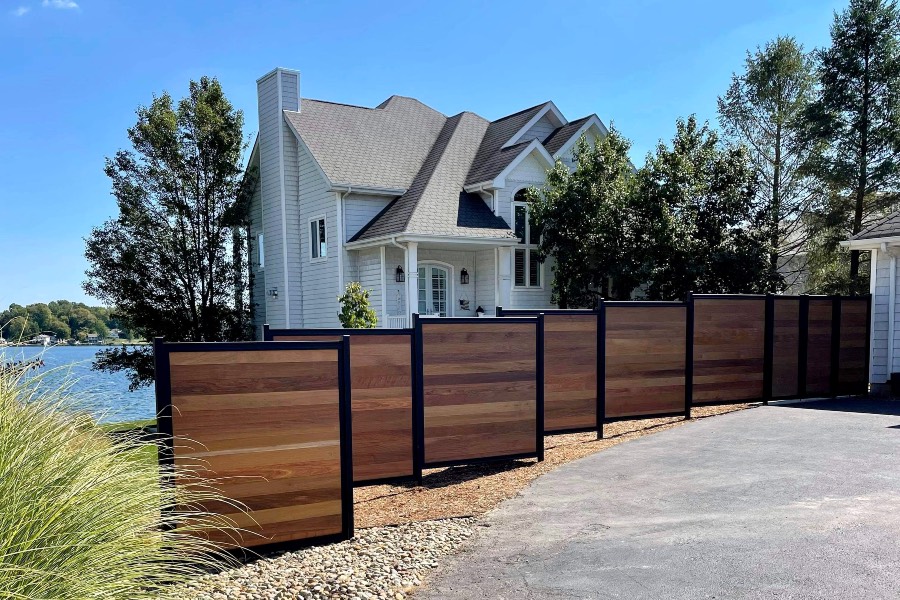All Categories
Featured

Among the most prominent choices, wood, vinyl, and aluminum each deal one-of-a-kind benefits and drawbacks. Here's a break down of the pros and disadvantages of these 3 usual fencing products.
Timber Fencing. Wood fence has actually been an ageless option for home owners because of its all-natural charm and flexibility.
Pros:. Visual Allure: Timber provides a cozy and traditional appearance that complements a variety of building styles. Adjustable: It can be repainted, discolored, or reduce into unique layouts to suit individual choices. Cost-efficient: Originally, timber fence can be a budget friendly choice contrasted to other products. Eco-Friendly: Wood is a renewable energy and can be sustainably sourced. Disadvantages:. High Upkeep: Timber needs normal securing, staining, or painting to avoid rot, insect damages, and weathering. Sturdiness Concerns: Without appropriate treatment, timber can warp, crack, or decay in time, specifically in locations with high humidity. Much shorter Lifespan: A timber fencing normally lasts 10-20 years, depending upon the sort of timber and level of maintenance. Wood is optimal for those who value a traditional appearance and want to commit to its maintenance.
Vinyl Fence. Plastic is a modern, low-maintenance fencing choice that has actually expanded in appeal in recent times.

Pros:. Low Maintenance: Plastic does not need paint, staining, or sealing and can be easily cleaned up with soap and water. Climate Resistant: It endures rough weather without decomposing, rusting, or bending. Long-Lasting: Vinyl fencings can last 20-30 years with marginal upkeep. Variety of Styles: Offered in several shades, styles, and appearances, some vinyl alternatives mimic the appearance of timber. Cons:. Greater Upfront Price: Vinyl fencing can be extra pricey initially compared to timber. Brittleness in Cold Weather condition: In extreme chilly, vinyl may break or end up being fragile. Limited Services: Individual panels can be tough to change, requiring mindful matching to the existing fence. Plastic is finest fit for home owners looking for a resilient, low-maintenance service with modern visual appeals.
Aluminum Secure Fencing. Aluminum fencing is a light-weight and sturdy option, typically chosen for its contemporary appearance and convenience.
Pros:. Rust-Resistant: Aluminum does not corrosion, making it an outstanding selection for moist or wet environments. Reduced Upkeep: Calls for minimal upkeep and is simple to clean. Resilient: While lightweight, light weight aluminum is strong enough to hold up against several environmental problems. Long Life-span: Can last several decades without considerable wear or degeneration. Variety of Styles: Supplies a stylish and smooth look, usually made use of for decorative or decorative objectives. Disadvantages:. Higher Price: The preliminary financial investment for light weight aluminum fence is greater than wood or vinyl. Much Less Personal privacy: Light weight aluminum fencings are typically designed with open pickets, making them much less effective for personal privacy. Prone to Damages: Although durable, light weight aluminum can be nicked by strong influences. Aluminum is perfect for those looking for a stylish, durable alternative that requires marginal care.
Making the Right Choice. Each secure fencing material-- vinyl, timber, and light weight aluminum-- uses unique benefits and negative aspects. Your choice needs to depend on your particular priorities, such as budget, upkeep preferences, climate, and aesthetic goals:
If you like a typical look and do not mind routine maintenance,Pick timber. Select vinyl if you desire a low-maintenance, weather-resistant fencing with modern charm. Select light weight aluminum if you prioritize durability, rust resistance, and a sleek design. By weighing these advantages and disadvantages, you can choose a fence product that improves your residential property while fulfilling your useful requirements.
Latest Posts
Find Out Cut Costs on Car Maintenance with Montclare Auto Repair’s Special Deals
Published May 29, 25
1 min read
Boost Your Building with Expenses Door Equipment
Published May 26, 25
1 min read
Find Affordable Auto Repairs with Montclare’s Limited-Time Service Specials
Published May 24, 25
1 min read